Search
Remove Ads
Advertisement
Summary 
Loading AI-generated summary based on World History Encyclopedia articles ...
Search Results
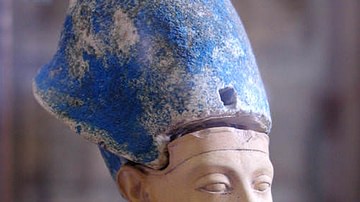
Definition
Akhenaten
Akhenaten (r. 1353-1336 BCE) was a pharaoh of 18th Dynasty of the New Kingdom of Egypt. He is also known as 'Akhenaton' or 'Ikhnaton' and also 'Khuenaten', all of which are translated to mean 'successful for' or 'of great use to' the god...
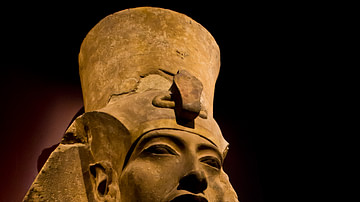
Definition
Amarna Period of Egypt
The Amarna Period of ancient Egypt was the era of the reign of Akhenaten (1353-1336 BCE), known as 'the heretic king'. In the 5th year of his reign (c. 1348 BCE), he issued sweeping religious reforms which resulted in the suppression of the...
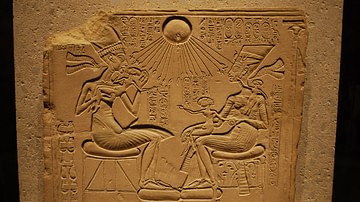
Definition
Amarna
Amarna is the modern Arabic name for the site of the ancient Egyptian city of Akhetaten, capital of the country under the reign of Akhenaten (1353-1336 BCE). The site is officially known as Tell el-Amarna, so-named for the Beni Amran tribe...

Article
The Art of the Amarna Period
Of all the pharaohs who ruled ancient Egypt, there is one in particular that stands out from the rest. Over the course of his 17-year reign (1353-1336 BCE), Akhenaten spearheaded a cultural, religious, and artistic revolution that rattled...
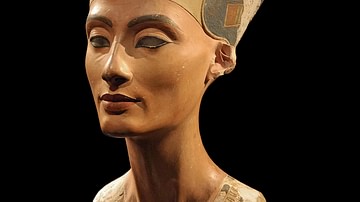
Definition
Nefertiti
Nefertiti (c. 1370 - c. 1336 BCE) was the wife of the pharaoh Akhenaten of the 18th Dynasty of Egypt. Her name means, `the beautiful one has come' and, because of the world-famous bust created by the sculptor Thutmose (discovered in 1912...
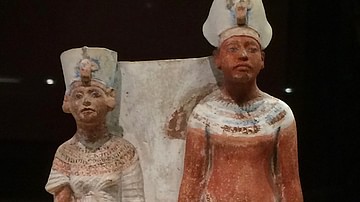
Image
Akhenaten & Nefertiti
Small, painted votive statue depicting the Pharaoh Akhenaten and his Great Wife Nefertiti holding hands, a notedly unusual pose in the art of the New Kingdom, c. 1345 BCE. The king wears the blue kheperesh crown, and the queen sports the...
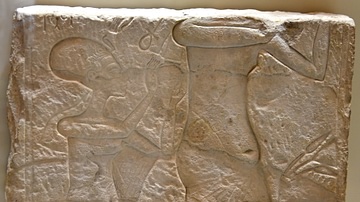
Image
Akhenaten & Nefertiti
On the left, queen Nefertiti (c. 1370 - c. 1336 BCE) follows her husband, Pharaoh Akhenaten(r. 1353-1336 BCE); both are worshipping Aten. Note the typical Amarna style of their depiction; her elongated head and his protuberant abdomen. Part...
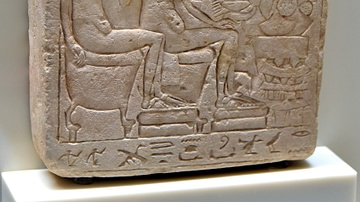
Image
Akhenaten & Nefertiti at a Feast
The royal couple, pharaoh Akhenaten (r. 1353-1336 BCE) and queen Nefertiti (c. 1370 - c. 1336 BCE), is seated at a feast, beneath the god Aten and under his rays. They are looking at each other and Nefertiti puts her right hand under Akhenaten's...
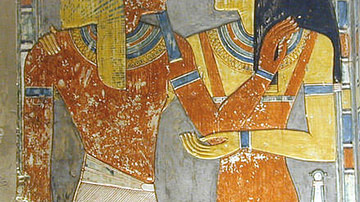
Definition
Horemheb
Horemheb (reigned 1320-1292 BCE) was the last pharaoh of the 18th dynasty of Egypt. He is also known as Dejserkheprure and Horemhab. His name means, “Horus is in Festival” and he came from the lower classes of Egypt, worked himself up through...
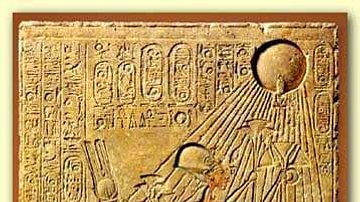
Image
Akhenaten Stele
A stele depicting Egyptian pharaoh Akhenaten (r. 1353-1336 BCE) and his family worshipping the Aten or sun disk.